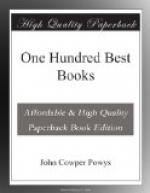15. NIETZSCHE. ZARATHUSTRA, THE JOYFUL WISDOM, AND ECCE HOMO are all translated in the English edition of Foulis and published in America by Macmillan. Lichtenberger’s exposition of his doctrines is in the same series. The most artistic life of him is by Daniel Halevy, translated from the French.
Nietzsche’s writings when they fall into the hands of Philistines are more misunderstood than any others. To appreciate his noble and tragic distinction with the due pinch of Attic salt it is necessary to be possessed of more imagination than most persons are able to summon up. The dramatic grandeur of Nietzsche’s extraordinary intellect overtops all the flashes of his psychological insight; and his terrific conclusions remain as mere foot-prints of his progress from height to height.
18. HEINE. HEINE’S PROSE WORKS WITH THE “CONFESSIONS,” translated in the “Scott Library.” A good short life of Heine in the “Great Writers” Series.
Heine’s genius remains unique. Full of dreamy attachment to Germany he lived and died in Paris, but his heart was always with the exiles of Israel. Mocker and ribald, he touches depths of sentimental tenderness sounded by none other. He fooled the philosophers, provoked the pious, and confused the minds of his free-thinking friends by outbursts of wilful reaction. He sticks the horns of satyrish “diablerie” on the lovely forehead of the most delicate romance; and he flings into his magical poems of love and the sea the naughty mud-pellets of an outrageous capriciousness.
19. SUDERMANN. SONG OF SONGS. Translation into English published by Huebsch of New York.
Sudermann is the most remarkable and characteristic of modern German writers. His massive and laborious realism, his firm and exhaustive exposition of turbulent and troubled hearts, his heavy sledge-hammer style, his comprehension of the shadowy background of the most ponderous sensuality, are all found at their best in this solemn and sordid and pitiable tale.
20. HAUPTMANN. THE FOOL IN CHRIST, translation published by Huebsch, New York.
Hauptmann seems, of all recent Teutonic authors, the one who has in the highest degree that tender imaginative sentiment mixed with rugged and humorous piety which one finds in the old German Protestant Mystics and in such works of art as the engravings of Albert Durer and the Wooden Madonna of Nuremburg. “The Fool in Christ”—outside some of the characters in Dostoievsky—is the nearest modern approach to a literary interpretation of what remains timeless and permanent in the Christ-Idea.
21. IBSEN. Any edition of Ibsen containing the WILD DUCK.
Ibsen is still the most formidable of obstinate individualists. Absolute self-reliance is the note he constantly strikes. He is obsessed by the psychology of moral problems; but for him there are no universal ethical laws—“the golden rule is that there is no golden rule”—thus while in the Pillars of Society he advocates candid confession and honest revelation of the truth of things; in the “Wild Duck” he attacks the pig-headed meddler, who comes “dunning us with claims of the Ideal.” Ultimately, though absorbed in “matters of conscience,” it is as an artist rather than as a philosopher that he visualizes the world.




